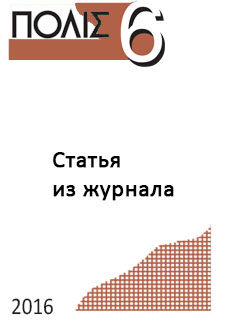Online shop of "Polis. Political Studies" Journal
We in the world, the world in us
Sakwa R. The Crisis of World Order: Russia’s Impasse and Resistance. – Polis. Political Studies. 2016. No 6. P. 52-68 (In Russ.) .
Free!
The only way for Russia to join the Atlantic community was through a process of transformation that was perceived to entail the repudiation of some fundamental elements that are considered constitutive of its identity, notably its autonomous political subjectivity and great power status. While Russia in the early post-Cold War years was ready to adapt to the exigencies of the world order represented by the Atlantic community, in the end the transformation demands proved too high. Russia increasingly felt trapped in a strategic impasse in which it could not join NATO or the European Union, yet its own space for sovereign development and great power interests were increasingly unable to find cooperative expression. The response was resistance and conflict. One form of this conflict was Russian support for forces that were disruptive of the Atlantic community, which is increasingly held responsible for the strategic impasse in which Russia found itself. For the first time since the fall of communism the idea of a ‘new world order’ is now once again on the horizon. The Cold War bipolar system will not be restored, but neither will a new ‘concert of powers’ take its place because of the great variety of actors with different ways of exerting influence. Neither element of the system will engage in deep integration but will instead retain general orientations with sufficient flexibility and economic potential to attract participants but not so exclusive as to generate bloc discipline.
 English
English Русский
Русский

Reviews
There are no reviews yet.